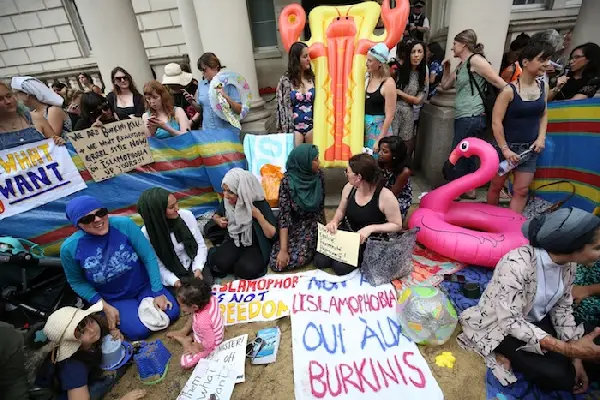
|
| A protest against France’s burkini ban, outside the French Embassy in London (Reuters) |
If you are a man in France, you can wear a wetsuit that covers your head and entire body. But a Muslim woman who chooses to wear a hijab at the beach will be ticketed and ordered to shed some clothing.
The hysteria and hypocrisy surrounding French municipalities’ ban on the “burkini” highlight the preexisting racism and hatred in the country, which carries the revolutionary motto of “liberty, equality and fraternity.”
Unlike what the name suggests, the burkini is not the beach version of the burqa, the ultra-conservative face veil. Rather, it is a full-body swimsuit created by an Australian company to accommodate hijab-wearing swimmers.
It should not be addressed within the context of France’s less outrageous ban on the burqa.
The Mediterranean city of Cannes, known for its film festival, led the anti-Muslim craze by outlawing the swimsuit two weeks ago. Its mayor said the long-sleeved swimwear does not adhere to “good morals and secularism.”
And then about 15 towns followed with their own bans. Several of them brought up security concerns, citing the deadly terrorist attacks in Paris and Nice as reasons for the new law.
As if Muslim woman enjoying a day at the beach pose a threat to France, which signed a $12-billion arms agreement last year with Saudi Arabia, where women in many cities are required to wear the burqa.
It is not a surprise that the hard-line monarchy, which is exporting extremist ideology, is a close ally of the secular European republic. Both countries hijack women’s right to choose and subjugate citizens to the government’s idea of morality.
France’s prejudice against its Arabs and Muslim citizens predate the Charlie Hebdo attacks and the rise of ISIS. Efforts against Muslims’ exercise of religion have been ongoing for two decades in the name of secularism. A 2014 survey showed that Muslims experience “extraordinary discrimination” in the job market.
France’s Muslims are economically disadvantaged. Millions of them are confined to suburbs (ghettos) that suffer high unemployment and crime rates.
Yet, the Arab and Muslim French have been loyal citizens and contributed tremendously to the republic, from legendary soccer player Zinedine Zidane to Minister of Labor Myriam El Khomri.
Moreover, the large immigrant population in France is partly the product of the country’s own imperialistic policies, which helped draw the current dysfunctional map of the Middle East and North Africa after World War I.
Hundreds of thousands of Algerians died while fighting French occupation and colonialism until the North African Arab country gained independence in 1962.
The draconian policies against French Arab citizens is a modern manifestation of the sense of racial supremacy that was used to justify colonialism. (France has yet to apologize for its colonial past).
“Clash of civilizations”
In citing terrorist attacks in their decision to ban the burkini, French municipal governments are telling the country’s 5 million Muslims that they view them as potential terrorists.
But the most alarming aspect about this burkini debate is the explicit expression of self-righteous nationalism. Terms like “French values”, “good morals” and “rules of hygiene” are deliberately intended to frame Muslims as the inferior “other.”
As trivial as the bans may sound, coastal French towns, backed by Paris, are promoting a “clash of civilizations” narrative. ISIS ideology is based in the same depiction of the current tides of history. The terrorists are painting an apocalyptic image of a war on Islam by “infidels” and “crusaders.”
Edward Said, who died 10 years ago on Aug. 25, addressed this phenomenon. In response to Samuel Huntington’s book “Clash of Civilization”, he wrote:
“We are all swimming in those waters, Westerners and Muslims and others alike. And since the waters are part of the ocean of history, trying to plow or divide them with barriers is futile. These are tense times, but it is better to think in terms of powerful and powerless communities, the secular politics of reason and ignorance, and universal principles of justice and injustice, than to wander off in search of vast abstractions that may give momentary satisfaction but little self-knowledge or informed analysis.”
Message to the community:
In the United States, citizens are blessed to have the Constitution and its First Amendment, which grant the absolute freedom of religion and the “free exercise thereof.”
However, the anti-Muslim policies in Europe are not too far from our shores. Rights guaranteed by the Constitution often come under attack during times of turmoil. Japanese American citizens were detained in internment camps during World War II. The law alone was not able to protect them.
Arab and Muslim Americans must be aware of the perils of hate — from bigoted individuals as well as from government agencies infested with institutionalized racism.
The French bans on religious freedoms should be a wake up call for Arab and Muslim communities to unite and form partnerships to stand strong against the storms of bigotry that might be heading our way.






1 Comment
Estella
March 9, 2017 at 5:22 amAn inigtlleent point of view, well expressed! Thanks!